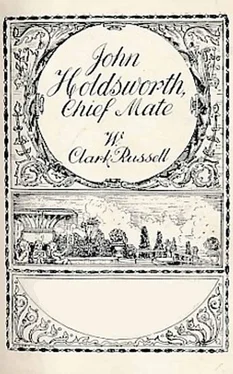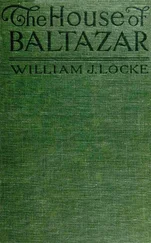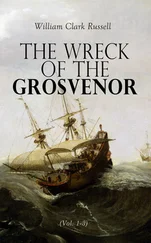William Clark Russell - John Holdsworth
Здесь есть возможность читать онлайн «William Clark Russell - John Holdsworth» — ознакомительный отрывок электронной книги совершенно бесплатно, а после прочтения отрывка купить полную версию. В некоторых случаях можно слушать аудио, скачать через торрент в формате fb2 и присутствует краткое содержание. Жанр: unrecognised, на английском языке. Описание произведения, (предисловие) а так же отзывы посетителей доступны на портале библиотеки ЛибКат.
- Название:John Holdsworth
- Автор:
- Жанр:
- Год:неизвестен
- ISBN:нет данных
- Рейтинг книги:3 / 5. Голосов: 1
-
Избранное:Добавить в избранное
- Отзывы:
-
Ваша оценка:
- 60
- 1
- 2
- 3
- 4
- 5
John Holdsworth: краткое содержание, описание и аннотация
Предлагаем к чтению аннотацию, описание, краткое содержание или предисловие (зависит от того, что написал сам автор книги «John Holdsworth»). Если вы не нашли необходимую информацию о книге — напишите в комментариях, мы постараемся отыскать её.
John Holdsworth — читать онлайн ознакомительный отрывок
Ниже представлен текст книги, разбитый по страницам. Система сохранения места последней прочитанной страницы, позволяет с удобством читать онлайн бесплатно книгу «John Holdsworth», без необходимости каждый раз заново искать на чём Вы остановились. Поставьте закладку, и сможете в любой момент перейти на страницу, на которой закончили чтение.
Интервал:
Закладка:
He scraped with his left foot, and stood bashfully awaiting orders, his glittering eyes travelling over the group of gentlemen and ladies.
“You’re wanted to sing a song, Daniels,” said Captain Steel.
“Ay, ay, sir. What might it be?”
“Something wild and plaintive,” suggested Mrs. Ashton.
“Give us a song about a sweetheart,” said Mr. Holland.
This was English to the sailor; so, after a few moments’ reflection, he screwed his fiddle into his neck, scraped a few bars, and then sang.
He did his best, and murmurs from time to time about the capstan illustrated enthusiastic appreciation in one portion of his audience at least. Those on the poop were more quiet, impressed by the peculiar wildness of the song, and the rough, uncouth melody of the tune.
The song was about a woman whose husband was a sailor. The sailor went away to sea, and did not come home, and she thought he had deserted her; so she put on man’s clothes, shipped on board a vessel as a “hand,” and went in search of him. One night she is on the forecastle, on the look-out. The watch are asleep; there’s not a breath of air:
When, looking over the starboard side,
She sees a face as pale
As snow upon a mountain top,
Or moonlight on a sail.
The figure attached to the face rises, waist high, out of the
water, and extends his hands.
“O God!” she screams, “is this my love?
Can this my Joey be?”
And then she casts her eyes above
And jumps into the sea.
And sure enough the phantom was Joey, who had not deserted her, as she had cruelly thought, but had been drowned in the very spot where the vessel she was on board of was becalmed. The song wound up with an injunction to all wives or sweethearts of sailors never to think that their Joes have played them false because they do not return to their homes.
The passengers thanked the man for his song, and Mrs. Ashton wanted another; but Captain Steel, holding that enough condescension had been exhibited, bade the singer go to the steward and get a “tot of grog.”
Much criticism followed; but all, with the exception of Mr. St. Aubyn, owned themselves impressed by the rough simplicity and tragical theme of the forecastle ballad.
“Pshaw!” cried the actor; “put the man on a stage before an audience, and he’d be hissed off. It’s the queer scratching of the catgut and the picturesque costume of the fellow that have pleased you. His voice isn’t good enough to get him the post of call-boy at a theatre.”
A warm argument followed this decision, and lasted nearly half an hour, during which the General and Mr. Ashton left the group; then the steward’s bell rang, and the passengers went below to their nightly potations and to munch sweet biscuits.
CHAPTER V. – A GALE OF WIND.
At midnight Holdsworth came on deck to relieve the second mate. A man out of the port watch came to the wheel, and stood yawning, scarcely awake. The night was dark—a hazy atmosphere through which the stars gleamed sparely, and the sea like ebony. The rise and fall of the ship flapped the sails against the masts and drove eddies of air about the decks, but in reality there was not a breath of wind.
There was something stupendous in the black, profound, and breathless placidity of the night. The compass swung round in the binnacle anywhere, but the swell made the rudder kick heavily now and again, and gave the wheel a twist that flung the spokes out of the man’s hand and woke him up.
This prolonged inactivity was galling. One longed to hear the rush of parting water and the singing of the wind in the shrouds.
The mainsail flapped so heavily that Holdsworth ordered it to be furled. The song of the men brought the captain on deck. He flitted, shadow-like, about the binnacle, sniffed at the night impatiently, and then went to Holdsworth.
“The glass has fallen half an inch since eight bells,” said he.
“Yes, sir; there’ll be a change before morning.”
“Better stow the royals and mizzen-top gall’ns’l.”
“Ay, ay, sir.”
These, the topmost sails of the ship, were just discernible from the deck. In a few moments their dim outlines melted, and some dark figures went up into the gloom and vanished.
The captain returned to his cabin, and Holdsworth strolled the deck. At two bells (one o’clock) the haze went out of the sky and the stars shone fiercely. Holdsworth, standing on the starboard side of the poop, felt a light air creeping about his face, and the sound of the flapping sails ceased.
“How’s her head?”
“North-a-quarter-west, sir.”
He sang out an order, and a crowd of figures came tumbling out of the forecastle and manned the port braces. The air died away, but presently came a quick puff which made the water bubble around the ship.
Holdsworth’s eyes were upon the weather-horizon. The stars burned purely, but away upon the water-line was a thick shadow.
Again the wind died out and there was a breathless stillness, amid which you might hear a sound—vague, murmurous, indescribable—a distant echo it might seem of something infinitely distant.
“Stand by the topgallant halliards!”
A sense of expectation seemed to pervade the very ship herself as she stood upright with her dim canvas flapping in the darkness above.
The distant murmur grew more defined, and took such a tone as you may hear in small sharp rain falling at a distance upon leaves. Then, out of the murky horizon some clouds came rolling—long, attenuated shadows, resembling visionary arms clutching at the stars. The murmur approached; the clouds, swinging along the sky, formed into compact groups. Hark to the quick hissing of the water lashed by the wind!
In a moment the sails were round and hard, the ship with her port-chains under water, and the wind screeching fiercely over the ebony surface of the sea, and whitening it with foam.
The captain was on the poop, holding on to the main-topgallant backstay, and shrieking orders like one possessed. It was indeed briefly a case of “Let go everything!” Under full topsail, foresail, staysails, and jibs, the ship was too heavily weighted for the surprising violence of the wind, and was powerless to right herself. But every order given was the right one. And now you heard the deep tones of Holdsworth’s powerful voice mingling with the agitated commands of the skipper, while yards came rushing down upon the caps, and sails banged and roared aloft, and men shouted lustily about the decks, and the sea fled in cataracts of foam under the vessel’s bows.
A time of deep excitement, but scarcely of suspense—there was too much hurrying for that.
There would have been something incredible to an inexperienced landsman in the sight of the dark figures swarming up the shrouds to give battle to the wild array of canvas which groaned and bellowed like a dozen thunderstorms in the sky—a spectacle of human pluck not to be realised, or in the faintest degree appreciated, by those who have not beheld it. The night black—the yards slanting so that the extremity of the main-yard touched the water; the footing upon those yards a thin line which must be felt for by the feet; the canvas, loosened by the lowering of the yard, bellied by the force of the wind many feet above the heads of the reefers, and presenting to their hands a surface of iron; and the three masts quivering under the shocks and convulsions of the sails!
All hands were at work now, and there were men enough to reef both big topsails at once, whilst others over their heads furled the topgallant sails. Holdsworth had been one of the first to spring up the main rigging; he knew the value of every pair of hands in that moment of danger; and away—active, daring, his hands and arms like steel—he clambered for the weather-earing. But the boatswain was before him, so he made for the lee yard-arm.
Читать дальшеИнтервал:
Закладка:
Похожие книги на «John Holdsworth»
Представляем Вашему вниманию похожие книги на «John Holdsworth» списком для выбора. Мы отобрали схожую по названию и смыслу литературу в надежде предоставить читателям больше вариантов отыскать новые, интересные, ещё непрочитанные произведения.
Обсуждение, отзывы о книге «John Holdsworth» и просто собственные мнения читателей. Оставьте ваши комментарии, напишите, что Вы думаете о произведении, его смысле или главных героях. Укажите что конкретно понравилось, а что нет, и почему Вы так считаете.











![William Frith - John Leech, His Life and Work, Vol. 2 [of 2]](/books/748201/william-frith-john-leech-his-life-and-work-vol-thumb.webp)
